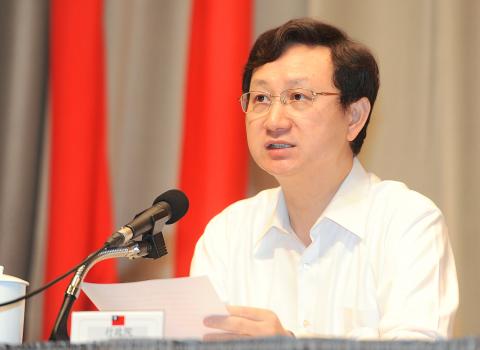The Cabinet yesterday passed amendments to the Labor Standards Act (勞動基準法) proposed by the Ministry of Labor, which would introduce “one fixed day off and one flexible rest day” — or yili yixiu (一例一休) — as two weekly days off to guarantee the realization of the 40--hour work week policy, while canceling seven days off for national holidays.
“With efforts from the Ministry of Labor, Executive Yuan staff and the Democratic Progressive Party [DPP] caucus, we have finally produced this version [of amendments]. Despite all the difficulties, it is a more feasible version that would lead to as little conflict as possible,” Premier Lin Chuan (林全) was quoted as saying by Cabinet spokesman Tung Chen-yuan (童振源) in a post-meeting news conference. “However, there are still differences of opinion, and we need to continue to communicate with the public.”
According to the ministry’s proposed amendments, employers may ask employees to work on their “fixed day off” only in the event of a natural disaster or emergency, and would have to compensate employees with double salary for the day plus an additional day off to make up for it.

Photo: Chang Chia-ming, Taipei Times
Regarding the “flexible rest day,” employers may ask employees to work after obtaining their consent, but are obligated to provide additional pay, ranging from one and one-third to one and two-thirds times the worker’s basic salary.
However, employees would not get an extra day off if they work on a “flexible rest day.”
Moreover, the proposal would also cancel seven holidays for workers to make all workers, including civil servants, enjoy the same number of national holidays.
The Cabinet’s final amendment proposals drew fire from both labor rights advocates and businesses.
Labor rights activists have been calling for two fixed days off per week and to keep the seven national holidays, while businesses have complained about the high overtime pay they have to offer employees to have them work on a “flexible rest day.”
The seven holidays that the ministry proposed to cancel were also a point of dispute as the government has revised its stance about whether to keep the holidays several times, and has been accused by labor activists of breaking its promise.
Separately, DPP caucus chief executive Wu Ping-jui (吳秉叡) said after a lunch meeting with the premier that the caucus would seek to pass the amendments in September.
“The premier would like the amendments to be passed as soon as possible, so that businesses can more accurately calculate their costs,” Wu said.
He said that not all caucus members supported the proposals, but added that working conditions would improve with the amendments, as they would require employers to provide more overtime pay and obtain consent from their employees to have them work on their rest days.

DAREDEVIL: Honnold said it had always been a dream of his to climb Taipei 101, while a Netflix producer said the skyscraper was ‘a real icon of this country’ US climber Alex Honnold yesterday took on Taiwan’s tallest building, becoming the first person to scale Taipei 101 without a rope, harness or safety net. Hundreds of spectators gathered at the base of the 101-story skyscraper to watch Honnold, 40, embark on his daredevil feat, which was also broadcast live on Netflix. Dressed in a red T-shirt and yellow custom-made climbing shoes, Honnold swiftly moved up the southeast face of the glass and steel building. At one point, he stepped onto a platform midway up to wave down at fans and onlookers who were taking photos. People watching from inside

A Vietnamese migrant worker yesterday won NT$12 million (US$379,627) on a Lunar New Year scratch card in Kaohsiung as part of Taiwan Lottery Co’s (台灣彩券) “NT$12 Million Grand Fortune” (1200萬大吉利) game. The man was the first top-prize winner of the new game launched on Jan. 6 to mark the Lunar New Year. Three Vietnamese migrant workers visited a Taiwan Lottery shop on Xinyue Street in Kaohsiung’s Gangshan District (崗山), a store representative said. The player bought multiple tickets and, after winning nothing, held the final lottery ticket in one hand and rubbed the store’s statue of the Maitreya Buddha’s belly with the other,

‘NATO-PLUS’: ‘Our strategic partners in the Indo-Pacific are facing increasing aggression by the Chinese Communist Party,’ US Representative Rob Wittman said The US House of Representatives on Monday released its version of the Consolidated Appropriations Act, which includes US$1.15 billion to support security cooperation with Taiwan. The omnibus act, covering US$1.2 trillion of spending, allocates US$1 billion for the Taiwan Security Cooperation Initiative, as well as US$150 million for the replacement of defense articles and reimbursement of defense services provided to Taiwan. The fund allocations were based on the US National Defense Authorization Act for fiscal 2026 that was passed by the US Congress last month and authorized up to US$1 billion to the US Defense Security Cooperation Agency in support of the

‘COMMITTED TO DETERRENCE’: Washington would stand by its allies, but it can only help as much as countries help themselves, Raymond Greene said The US is committed to deterrence in the first island chain, but it should not bear the burden alone, as “freedom is not free,” American Institute in Taiwan Director Raymond Greene said in a speech at the Institute for National Defense and Security Research’s “Strengthening Resilience: Defense as the Engine of Development” seminar in Taipei yesterday. In the speech, titled “Investing Together and a Secure and Prosperous Future,” Greene highlighted the contributions of US President Donald Trump’s administration to Taiwan’s defense efforts, including the establishment of supply chains for drones and autonomous systems, offers of security assistance and the expansion of